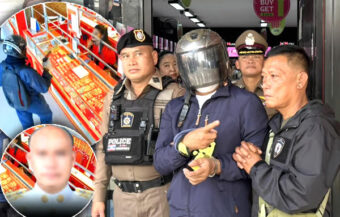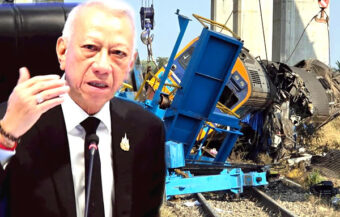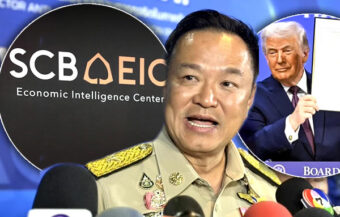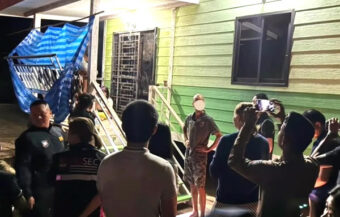US academic Paul Chambers faces deportation from Thailand after losing his job and visa despite charges being dropped. The respected professor, who has lived in Thailand since 1993, now awaits an immigration appeal as fears grow over his possible expulsion.
Just days after charges under Article 112 and the Computer Crime Act were dropped, it emerged that US Professor Paul Chambers was dismissed from his position at Naresuan University. The respected academic, who has lived in Thailand since 1993, now finds himself in a precarious legal situation, with no valid visa or legal right to remain in the country. His passport is currently being held by the Immigration Bureau, which also revoked his visa and, as a result, his work permit. Fears are growing that Chambers may face deportation unless he succeeds in his appeal to have his visa reinstated—a challenge made more difficult by the fact that his university employment officially ended on April 9.
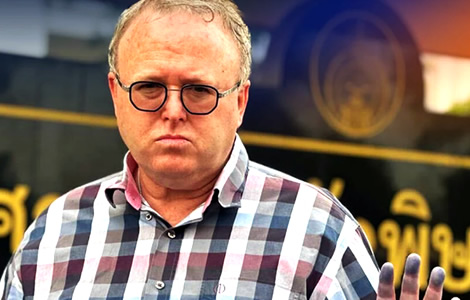
Naresuan University has terminated Paul Chambers, an American academic, despite criminal charges against him being dropped. The decision followed immigration authorities’ move to revoke his visa. That action made him ineligible to work in Thailand.
On May 2, 2025, Thai Lawyers for Human Rights confirmed the university’s termination order. The dismissal took effect on April 9. This was the day after Mr Chambers reported to Phitsanulok Police Station to acknowledge charges.
He was subsequently arrested despite protesting that the substance of the charge had nothing to do with him.
Chambers detained overnight after bail denied despite disputing link to lèse-majesté seminar case
Afterwards, he was denied bail and spent a night at Phitsanulok Central Prison. The next day bail was granted but on strict terms. In addition, a surety of ฿300,000 was required.
Associate Professor Panu Bhuddhawong, Vice President for Administration, signed the order on behalf of the university president. It stated that Chambers no longer fulfilled legal conditions to continue his employment.
This came despite prosecutors this week deciding not to indict Chambers under Article 112, Thailand’s strict lèse majesté law. The law criminalises insulting or defaming the monarchy. Violations can lead to long prison sentences and are highly politicised.
Chambers was accused under Article 112 following a blurb for an online seminar in October 2024. That was in Singapore, organised by ISEAS – Yusof Ishak Institute. He denied any links with the material written.
However, last week a spokesman for Internal Security Operations Command (ISOC) Region 6, Major General Winthai Suvari, said the charges held more substance. That was just hours before the Phitsanulok Attorney General gave the order not to prosecute.
University sacked Chambers despite dropped charges under Article 112 and military-linked claims
Similarly, a case under the draconian Computer Crime Act 2007 was also dropped.
The day previously, Mr Chambers had his bail conditions lightened. In brief, he was allowed to remove an ankle bracelet he had worn since April 9 last, when released from prison.
It is understood that Mr Chambers is a target of ultra-conservatives in Thailand. Indeed, it is reported that he is a particular target in Phitsanulok, with the university regularly criticised for employing him. This is because of his public commentary on Thai military and political affairs.
His academic work often gives an in-depth appraisal of the role of the Thai military in domestic politics.
For years, Chambers has been a prominent voice on Southeast Asian security issues. He is widely quoted in global media, in particular as a Southeast Asian defence expert in Jane’s Defence Weekly and prestigious US publications.
Although the prosecutor dropped charges earlier this week, immigration authorities still maintain their decision to revoke his visa. In the meantime, Chambers has filed an appeal with the Immigration Commission.
Bail eased and charges dropped but Chambers remains in jeopardy over visa revocation and backlash
However, that appeal has yet to be resolved. Right now, he faces ongoing legal and administrative restrictions. These conditions remain in place while his immigration status is under review.
Moreover, immigration officials confiscated his passport under the terms of his bail.
Although his passport had only recently been returned, authorities re-seized it after the visa ruling.
Without a valid visa or work permit, Chambers is now at risk of deportation. Certainly, if the Immigration Commission upholds the revocation, he will be forced to leave Thailand. Significantly, Chambers has taught in Thailand for over thirty years and held a respected position at Naresuan University.
Naresuan University acted swiftly once immigration authorities changed Mr Chambers’ legal status. It cited the need to comply with employment laws that require foreign staff to hold a valid visa.
Chambers now risks deportation after visa seized despite decades of service in Thai academia
The university made no mention of his Article 112 case in its termination notice. However, the timing strongly links his dismissal to the broader controversy.
Chambers’ supporters say the decision undermines academic freedom in Thailand. They argue the university should have waited for the immigration appeal result.
In contrast, the university insists it followed legal procedures and had no alternative under current immigration law.
Meanwhile, rights groups continue to raise concerns over the misuse of Article 112. They say the law is frequently employed to silence critics, including academics and journalists. This is because any Thai citizen can file such a complaint. Although Chambers avoided prosecution, the fallout from the accusation has been severe.
His career in Thailand has effectively ended. He is now under threat of expulsion despite no conviction. Furthermore, his personal freedoms remain limited. Without a passport or visa, he cannot travel or legally reside elsewhere.
Rights groups alarmed as Chambers faces lasting damage despite no conviction or proven wrongdoing
This case has drawn international attention. Certainly, the decision not to prosecute Mr Chambers came after a review was ordered. This in turn came after reports that US trade negotiators had raised the case with the Thai government.
This was revealed previously by former Premier Thaksin Shinawatra. Later on Thursday, hours after the prosecutors dropped the charges, Minister of Finance Pichai Chunhavajira appeared to accept that it was linked to the negotiations. On Thursday he said he thought a solution would be found.
The fallout from the prosecution raises questions about the balance between national security and academic discourse in Thailand. Ultimately, Chambers’ dismissal shows how non-criminal actions can still result in professional and personal consequences.
Even after prosecutors drop a case, the administrative system can continue to impose penalties. For now, Chambers remains in Thailand under strict conditions. His next immigration report is expected within weeks.
Case sparks global interest as US trade pressure suspected in Thai decision to drop all charges
If deported, he may be barred from returning, ending his academic career in the country permanently. The US citizen from Oklahoma has lived in Thailand since 1993. He is married to Associate Professor Napisa Waiturakiet, who is Dean of the Faculty of Social Sciences at Naresuan University in Phitsanulok.
Chambers has made no public comment since the termination was confirmed. However, sources close to him say he intends to fight his visa revocation to the end. Significantly, under the 1979 Immigration Act, the final decision ultimately rests with Deputy Prime Minister Anutin Charnvirakul as the Minister of the Interior.
Phitsanulok Attorney General decides to drop charges against US academic Paul Chambers in case review
US University lecturer Paul Chambers jailed over lèse-majesté charge as Phitsanulok Court denies bail
Whether he will succeed depends on decisions yet to come from Thailand’s immigration and legal authorities. Indeed, his case shows clearly that the position of any foreigner in Thailand is tenuous under the Kingdom’s strict immigration laws.
Join the Thai News forum, follow Thai Examiner on Facebook here
Receive all our stories as they come out on Telegram here
Follow Thai Examiner here
Further reading:
Third Army defends its role in the prosecution of American Professor Paul Chambers in Phitsanulok
Thaksin confirms that the Paul Chambers case now being raised by US trade negotiators with Thailand
Thaksin does not rule out joining talks in US as Thai team finalises plans. They fly out on Thursday
Trump’s remaking of World trade, if it works, will force Thailand to decide between the US and China

